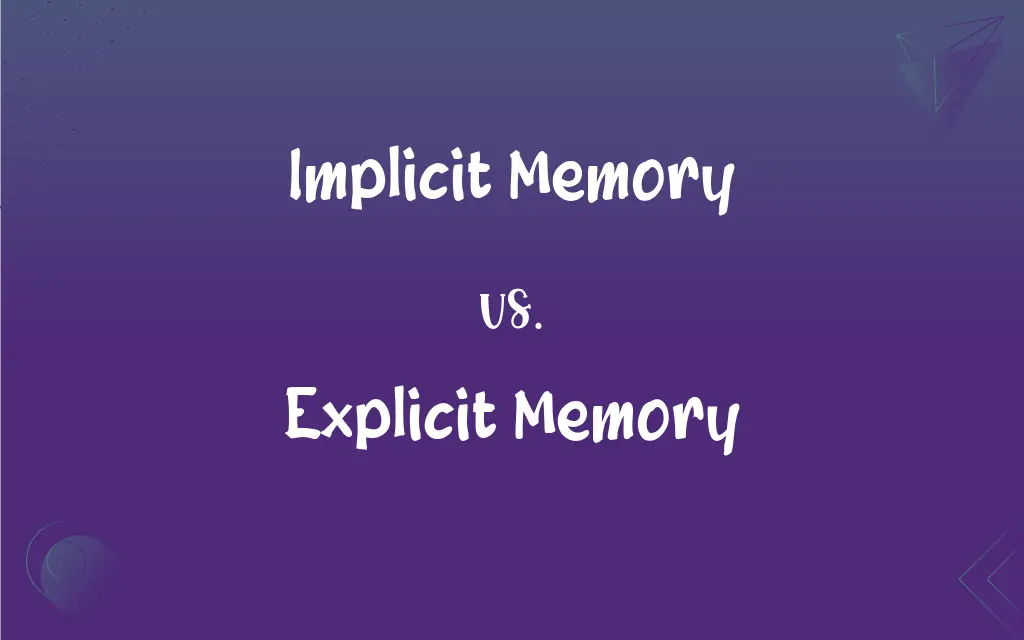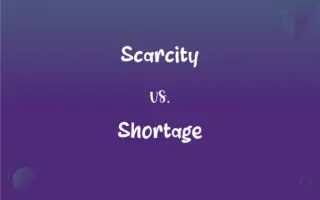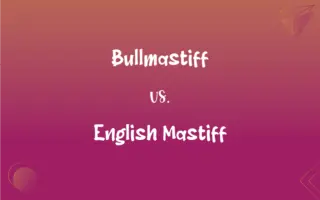Implicit Memory vs. Explicit Memory: What's the Difference?
Edited by Janet White || By Harlon Moss || Updated on October 6, 2023
Implicit memory is unconscious memory of skills and how to do things, while explicit memory involves conscious recall of facts and events.

Key Differences
Implicit memory and explicit memory fundamentally cater to different dimensions of our memory and recall capabilities. Implicit memory encompasses our unconscious mind, where information is stored and recalled without deliberate, conscious engagement. Explicit memory, on the contrary, is very much situated within our conscious minds, involving the intentional retrieval of information such as facts, data, or personal experiences. Thus, while implicit memory relates to our skills and habits, explicit memory connects to our knowledge and episodic memories.
Implicit memory is often automatic and is manifested through enhanced processing or performance due to prior experience, without conscious awareness of these previous experiences. Explicit memory, however, involves conscious recall and is often declarative, since it involves retrieving information that can be declared or verbalized, such as stating the capital of a country or recalling a past event. Both implicit memory and explicit memory operate in harmony, but each plays distinct roles in our daily activities and overall learning process.
For instance, implicit memory is the engine behind skills like riding a bicycle or typing on a keyboard, where your body recalls the skill without needing conscious thought. Explicit memory, on the other hand, is deployed when you actively recall who taught you to ride that bicycle or consciously remember the day when you first learned typing. It is a conscious act of recalling or recognizing specific events or facts from the past, thereby acting as a bridge to our experiences and learned knowledge.
In practical applications, such as in psychology or neurology, understanding implicit memory can provide insights into how habits are formed and how skill-based learning occurs. Whereas, exploring explicit memory opens doors to comprehending how knowledge is stored and recalled, which can be pivotal in understanding cognitive functioning and conditions like amnesia or other memory-related disorders. Therefore, implicit memory and explicit memory serve as two critical, disparate windows into exploring, analyzing, and comprehending the various facets of human memory.
Even though implicit memory and explicit memory cater to diverse faculties of our cognitive functioning, they intertwine to construct our overall memory system. Implicit memory contributes silently to our daily functioning by automating skill execution and enhancing certain perceptual and cognitive operations, while explicit memory actively enables us to navigate through our sociocultural environment by recalling facts, events, and contexts. Both memory types, therefore, construct the holistic frame of our cognitive, perceptual, and motor functioning, while still being distinctly categorized due to their differential operations, effects, and roles in our memory system.
ADVERTISEMENT
Comparison Chart
Conscious Recall
Not required (automatic).
Required (intentional).
Type of Information
Skills and habits.
Facts and events.
Involvement in Learning
Unconscious learning through repetition.
Conscious learning and recall.
Application Example
Riding a bike without thinking about it.
Recalling your first bike ride.
Associated Brain Areas
Primarily basal ganglia and cerebellum.
Mainly hippocampus and medial temporal lobe.
ADVERTISEMENT
Implicit Memory and Explicit Memory Definitions
Implicit Memory
It is a type of memory that enables us to perform tasks without active, conscious thought.
The chef’s implicit memory ensured precise chopping skills while conversing with colleagues.
Explicit Memory
It pertains to the conscious recall of factual information and personal experiences.
His explicit memory provided the historical dates needed for the examination.
Implicit Memory
Implicit memory involves the automatic, unconscious retrieval of previously learned information.
Despite not driving for a while, her implicit memory facilitated smooth gear shifting.
Explicit Memory
Explicit memory involves conscious and intentional recollection of previous experiences and information.
Using explicit memory, she recalled the details of their first meeting.
Implicit Memory
Implicit memory encompasses learned skills and habits that are recalled without conscious awareness.
His implicit memory guided his hands in skillfully crafting the clay pot on the wheel.
Explicit Memory
Explicit memory is the intentional recollection of facts, data, and events using conscious effort.
The professor employed explicit memory to derive the mathematical theorem on the board.
Implicit Memory
It refers to memory that doesn’t require deliberate cognitive effort and is not consciously controlled.
Through implicit memory, he was able to effortlessly tie his shoelaces without contemplating the steps.
Explicit Memory
It is a type of memory that requires conscious thought and is often verbally describable.
He utilized his explicit memory to describe the process of photosynthesis accurately.
Implicit Memory
Implicit memory is the unconscious recall and influence of past experiences on behavior.
Even after years, her implicit memory allowed her to play the piano smoothly.
Explicit Memory
Explicit memory encompasses remembering specific information through a conscious retrieval process.
Her explicit memory helped her recall and narrate a story from her childhood.
FAQs
Is it possible to have a strong explicit memory but weak implicit memory?
Yes, strengths in explicit and implicit memory can vary independently.
Are implicit and explicit memory located in the same brain region?
No, they are generally associated with different brain regions like the cerebellum (implicit) and hippocampus (explicit).
How is implicit memory demonstrated in our daily lives?
It's seen in skills and habits, like riding a bike, which we perform without conscious thought.
Can explicit memory decline with age?
Yes, explicit memory can decline with age, impacting recall of recent events or new information.
Can someone access implicit memories consciously?
No, implicit memories are not consciously accessible and influence behavior automatically.
What is the basic difference between implicit and explicit memory?
Implicit memory is unconscious and automatic, while explicit memory requires conscious recall.
Are there disorders that specifically affect explicit memory?
Yes, disorders like Alzheimer's Disease can significantly impact explicit memory.
Can trauma impact explicit memory?
Yes, trauma can affect the ability to consciously recall certain events or details (explicit memory).
Is driving a car an example of implicit memory?
Yes, once learned, driving involves automatic, unconscious processes, indicative of implicit memory.
How does sleep affect implicit and explicit memory?
Sleep can enhance both memory types, but its role might be more pronounced for explicit memories.
How is explicit memory used in learning?
It’s used to intentionally recall and apply facts, concepts, and experiences in a learning context.
How does stress affect explicit memory?
Stress can impair the retrieval of explicit memories, particularly in high-pressure situations.
Can explicit memory become implicit over time?
Yes, through practice, explicit memories (like learning a skill) can become implicit.
Which type of memory is involved in recalling facts for a test?
Explicit memory, as it involves conscious recall of learned information.
How is explicit memory used in eyewitness testimony?
Witnesses use explicit memory to consciously recall and describe events, persons, or objects seen.
Can implicit memory influence our preferences?
Yes, our likes and dislikes can be shaped by implicit memories of past experiences without our awareness.
Can explicit memory be improved through training?
Yes, techniques like mnemonic devices and rehearsal can enhance explicit memory.
Is it possible to measure implicit memory?
Yes, through observing behavioral changes that indicate prior learning without conscious recall.
How are habits related to implicit memory?
Habits are underpinned by implicit memory, as they are performed automatically without conscious thought.
Why is implicit memory important in learning skills?
It allows us to perform learned skills automatically and efficiently without conscious effort.
About Author
Written by
Harlon MossHarlon is a seasoned quality moderator and accomplished content writer for Difference Wiki. An alumnus of the prestigious University of California, he earned his degree in Computer Science. Leveraging his academic background, Harlon brings a meticulous and informed perspective to his work, ensuring content accuracy and excellence.
Edited by
Janet WhiteJanet White has been an esteemed writer and blogger for Difference Wiki. Holding a Master's degree in Science and Medical Journalism from the prestigious Boston University, she has consistently demonstrated her expertise and passion for her field. When she's not immersed in her work, Janet relishes her time exercising, delving into a good book, and cherishing moments with friends and family.































































